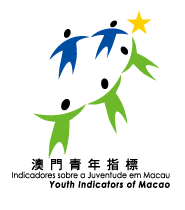
| Introduction | | | About indicators | | | Download | | | Contact us | | |
 In September 2001, the Education and Youth Affairs Bureau of the Macao Special Administrative Region (SAR) government commissioned the research of ‘Macao Youth Indicators Profile Project’ to University of Macau. 10 areas of research (including population, marriage and family, physical and mental health, education and training, labour force and employment, cultural, leisure, recreational and sports activities, civic duties and social participation, youth crime and deviant behaviours, values, consumption and quality of life, social environment and youth policy) and 80 indicators were established in February 2003. The project also defined the age range of ‘youth’ in Macao as any individual aged between 13 and 29.
In September 2001, the Education and Youth Affairs Bureau of the Macao Special Administrative Region (SAR) government commissioned the research of ‘Macao Youth Indicators Profile Project’ to University of Macau. 10 areas of research (including population, marriage and family, physical and mental health, education and training, labour force and employment, cultural, leisure, recreational and sports activities, civic duties and social participation, youth crime and deviant behaviours, values, consumption and quality of life, social environment and youth policy) and 80 indicators were established in February 2003. The project also defined the age range of ‘youth’ in Macao as any individual aged between 13 and 29.
Youth Affairs Committee of Macao SAR government set up the ‘Macao Youth Indicators Profile Project’ Task Force in 2003 to follow up with every aspect of the research project and data collection.
The Youth Indicators of Macao aims to enable the public to obtain the most up-to-date information of the Macao youth aged 13-29. Through better understanding on the interests and needs of the young people, the public can propose their ideas to the government; which can act as reference for the formulation of youth policies in the future.
Planning and review were carried out on the relevant indicators in 2007. In line with the basis of the project, the composition of the profile was revised to 10 areas and 78 indicators. Area 10 was renamed “Social Environment and Youth Development”
In 2017, in response to the recommendations of the mid-term review report of the "Macao Youth Policy (2012-2020)", the Indicators Profile was reorganised and optimised again, and relevant indicators such as youth competitiveness and environmental protection awareness were added. The adjusted indicator profile covers 79 indicators in ten areas.
In 2021, in conjunction with the SAR government’s promulgation and implementation of the optimised "Macao Youth Policy (2021-2030)", the indicator system will be adjusted for the third time. In response to the vision, policy direction and goals of the new round of youth policies, as well as emerging youth issues, the field of "family and country feelings" has been added, and indicators of happiness, comprehensive competitiveness, social participation, and integration into regional cooperation have been added. The adjusted indicator system has a total of 80 indicators in 11 areas.
There are two major research methods: 1) Data collection: statistics given by government departments and 2) Social survey: statistics collected from social surveys.